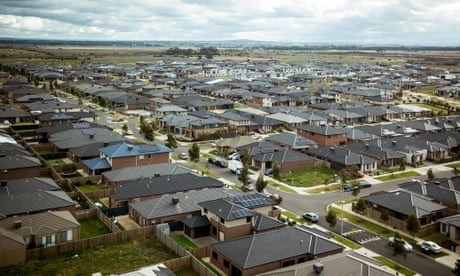- by foxnews
- 08 Apr 2025
Voters in fast-growing suburbs have some of Melbourne’s worst access to services, analysis shows
Voters in fast-growing suburbs have some of Melbourne’s worst access to services, analysis shows
- by theguardian
- 21 Nov 2022
- in news

Outer suburban electorates with high rates of growth have some of Melbourne's worst access to social infrastructure, despite political parties closely watching the areas ahead of the Victorian state election, new analysis has shown.
Based on research conducted by the Australian Urban Observatory, half of the 20 suburban electorates with the lowest liveability rankings are located in the outer north and south-west.
They include Labor heartland seats and some where independent candidates are attempting to harness frustration about infrastructure pressures on the region's ballooning population.
However, 12 are "safe" seats, held on margins higher than 5%. The director of the Australian Urban Observatory, Dr Melanie Davern, said voters in safe seats were often disadvantaged by poorer access to services.
"If you want to live somewhere, perhaps you want to live in a marginal seat," she said. "The marginal seats are where people are trying to provide services whereas when you're in a safe seat, it's easier to not be worried."
The observatory's "social infrastructure index" is based on access to 16 key everyday services, including childcare services, GP clinics, sporting facilities and libraries.
Richmond topped the list, with a score 13. Other inner-city seats, including Melbourne, Brunswick, Prahran and Albert Park, also ranked highly.
But the ultra marginal Labor-held electorate of Nepean - on the Mornington peninsula in Melbourne's south-east - had the lowest infrastructure ranking, scoring 2.53 from a possible score of 16.
Nepean's Labor MP, Chris Brayne, who won the seat off the Liberal party at the 2018 election, said he had received no response after writing to politicians to improve the area's infrastructure access for years.
He pointed to the rebuilding of local schools and the Rye Pier as achievements during his first term.
"Slowly but steadily, things are finally starting to happen on the Mornington peninsula," he said. "We had politicians on the peninsula who took us for granted.
"We don't need patchy election promises, we need someone who will keep getting things done."
But Liberal candidate Sam Groth said a Coalition government would deliver for the electorate by upgrading the Mornington Peninsula Freeway and redeveloping Rosebud hospital.
"Under the Andrews-Labor government, communities across Nepean have been short-changed on critical road and community infrastructure," he said.
In Melbourne's west, the latest census data showed some of the fastest-growing local government areas can be found.
The Labor-held electorate of Werribee - about 30km south-west of the city - had a score of 4.43.
The chair of council advisory committee LeadWest, Peter Maynard, said state and federal governments needed to invest in the region.
"We need to cater for the current population, but also to plan and accommodate for future growth," Maynard said.
"The outer western suburbs are booming with population growth expected to more than double in the next 30 years, so there is a lot of work to do, let alone preparing for future needs."
Maynard, the mayor of Wyndham City, said LeadWest had been calling for a co-designed mental health program, particularly for young people in the region, as well as increased cycling connections and a review of the area's bus networks.
Davern said across the country, growth areas had long been subjected to poor planning, where key services did not arrive until the population reached critical mass.
"Nobody's actually thinking about when we put the houses in, what kind of services can we put in there," she said.
"We wait up to 10 years or more before people get even a supermarket and maybe even a school."
Davern said the research found access to the 16 services had an impact on people's life satisfaction and happiness.
"Social infrastructure has sometimes been described as soft infrastructure," she said. But it's definitely not soft in terms of the impact it makes on people's lives."
- by foxnews
- descember 09, 2016
Ancient settlement reveals remains of 1,800-year-old dog, baffling experts: 'Preserved quite well'
Archaeologists have recently unearthed the remarkably well-preserved remains of a dog from ancient Rome, shedding light on the widespread practice of ritual sacrifice in antiquity.
read more


